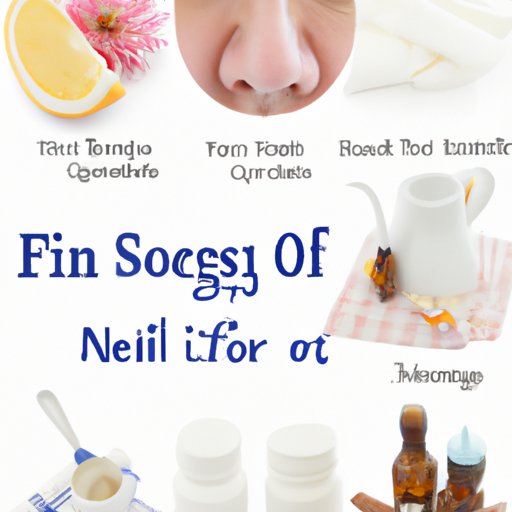Introduction
Nasal congestion, or a stuffy nose, is a common symptom of many conditions that affect the nasal passages. It can be uncomfortable, unpleasant, and disruptive to daily life. Understanding how a stuffy nose works is important in order to identify the underlying cause and find an effective solution.
Explaining the Anatomy and Physiology of a Stuffy Nose
The nose is made up of two nostrils that are connected to the nasal cavity. The nasal cavity is divided into two halves by a thin wall called the septum. Air passes through the nostrils and into the nasal cavity, which is lined with tissue called the nasal mucosa. This tissue contains blood vessels, nerves, and glands that secrete mucus.
The nasal passages are lined with membranes that help to filter, warm, and humidify the air. The membranes also produce a thin layer of mucus, which traps dust and other particles and prevents them from entering the lungs. This mucus then drains down the back of the throat, where it is swallowed. If the mucus becomes thicker than usual, it can block the nasal passages, leading to a stuffy nose.
Causes of a Stuffy Nose and How to Treat It
A stuffy nose can be caused by a variety of conditions, including the common cold and flu, allergies, and sinusitis. Allergies occur when the body’s immune system reacts to a foreign substance, such as pollen or pet dander, by releasing histamine. Histamine causes inflammation of the nasal passages, resulting in a stuffy nose. Sinusitis is an infection of the sinuses, which can lead to swelling of the nasal passages and a buildup of mucus.
Treatment for a stuffy nose depends on the underlying cause. For allergies, antihistamines can be used to reduce inflammation and reduce symptoms. Decongestants can be used to reduce swelling and open up the nasal passages. For sinusitis, antibiotics may be prescribed to clear the infection. In some cases, surgery may be necessary to repair any damage to the nasal passages.

Home Remedies for a Stuffy Nose
There are a few home remedies that can help relieve a stuffy nose. Saline spray can be used to moisten the nasal passages and reduce swelling. Steam inhalation can help loosen mucus and provide relief. Nasal irrigation can also be used to flush out mucus and irritants. A hot compress applied to the face can help reduce inflammation and open up the nasal passages.
Allergens That Can Cause a Stuffy Nose
Common allergens that can cause a stuffy nose include pollen, pet dander, dust mites, and mold. Pollen is released by plants during certain times of the year, while pet dander is shed by animals. Dust mites are microscopic arthropods that live in dust and feed on human skin cells. Mold is a type of fungus that grows in damp areas, such as bathrooms and basements.

Natural Ways to Unclog a Stuffy Nose
There are also several natural ways to unclog a stuffy nose. Eating spicy foods, such as chili peppers, can help open up the nasal passages. Drinking plenty of water can help thin out mucus and make it easier to expel. Avoiding dairy products, such as milk and cheese, can also help reduce mucus production. Essential oils, such as eucalyptus oil and peppermint oil, can be used to help open up the nasal passages.

Health Benefits of Keeping a Stuffy Nose in Check
Keeping a stuffy nose in check can provide numerous health benefits. Improved breathing can help reduce fatigue and improve sleep quality. It can also reduce the risk of infection, as thick mucus can trap bacteria and viruses. Finally, it can improve the sense of smell, as a blocked nose can interfere with the ability to detect odors.
Conclusion
A stuffy nose is a common symptom of many conditions that affect the nasal passages. Understanding its anatomy and physiology is important in order to identify the underlying cause and find an effective solution. Treatment options include medications, home remedies, and natural remedies. Keeping a stuffy nose in check can provide numerous health benefits, such as improved breathing and a better sense of smell.
(Note: Is this article not meeting your expectations? Do you have knowledge or insights to share? Unlock new opportunities and expand your reach by joining our authors team. Click Registration to join us and share your expertise with our readers.)
